.jpg)
Now Open: Mountain Equipment Co-op, 8th Avenue Store, 1982
It has been a lingering death that began 3 decades ago, when Mountain Equipment Co-op abandoned its founding principles.
Just a year shy of its 50th anniversary as a (putative) member-driven cooperative, MEC will be sold to California-based private investment firm Kingswood Capital Management LP. Another Canadian institution sold down the Swanny.
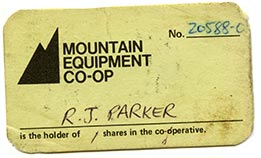 It was inevitable, I suppose, given human nature. Ideals wither in the face of the urge to acquire. In fact, I bought my first $5 membership at the Calgary store, the second location after Vancouver, in 1977.
It was inevitable, I suppose, given human nature. Ideals wither in the face of the urge to acquire. In fact, I bought my first $5 membership at the Calgary store, the second location after Vancouver, in 1977.
The CBC quoted an old colleague, Sarah Golling, last night. Her observation is shared by many of the founding members.
“I think it lost its cooperative focus. It got taken over, it got co-opted, it got sucked into the capitalist, eternal growth thing.”
In another interview, Golling singled out management as perpetrators of the sort of “anti-cooperative values” MEC was “actually founded to provide members with an alternative to.”
As MEC turned 10, in 1981, staff and a few board members questioned the Co-op’s growth into a general sporting goods store, competing with “big box” retailers. Did we need to carry sports shirts and running shoes?
The cooperative, after all, began from a simple idea: to provide local adventurers (from the back of a Volkswagen Van) affordable mountaineering equipment, hence the name. It naturally expanded to include other outdoor products: tents, backpacks, lightweight hiking and climbing stoves, cross-country and ski mountaineering (not downhill) gear, and thanks to myself and Marty Young, a bicycle accessory department that years later grew to include bicycles, including an MEC-branded line.
Right there was an example of overreach that MEC was not qualified to pursue. It did not endear them to independent, local bike shops whose proprietors had often been supportive members. They saw the Co-op’s acquisitiveness as a kick in the spokes. As someone who came to MEC (in 1981) from the LBS world (beginning at Cap’s Bicycle Shop’s original Sapperton store, in 1968), bringing with me my contacts in the industry, I felt just a bit responsible, having encouraged buyers to stock those first cycling accessories.
At the 3rd bricks-and-mortar location (after 4th Ave. and Fir St.), the discord set in. As I’ve written here before, it was the betrayal of loyal, experienced associates in favour of an outside management hire that set the stage for a rather nasty rupture, in 1983. The Vancouver shop, at 8th and Yukon, operated like a dysfunctional climbing expedition, with infighting and competition for a crack at the “summit.”

What the hell’s going on?
That ideological shift was the first example of the pursuit of growth at the expense of qualified product expertise. Perhaps some of the early acquisitions and expansions could have been rationalized if they had accomplished another of the founding ideas: affordability. But prices kept rising until they seemed to be no better than those at competing stores that clustered like limpets around each new MEC location. And, many of the high-turnover staff were no more knowledgeable than clerks over at Canadian Tire’s camping department.
In the next phase, offshoot businesses that had provided employment for local entrepreneurs (some former staff and associates) were abandoned in favour of offshore manufacturers using cheap labour.
Complaints from board and members at large were ignored.
While I’ve been assembling this post a new resistance of sorts has formed amongst members who believe those founding principles may yet be rekindled. Online petitions (with up to 30,000 141,000 signatures) have been launched to save “Meck.” Some legal experts have questioned the legality of the governing board’s autocratic decision. In response, talking suits opine that that’s the way corporations work. Even premier John Horgan has expressed his disappointment.
As I’ve said in other MEC-related posts (see “mec” tag below), I owe Mountain Equipment Co-op a certain amount of gratitude. In 1981, it was my dream job. Many of the staff were my friends, room mates, and expedition partners, with whom I formed relationships both fleeting and lifelong. The Co-op provided a chance to develop my commercial photography expertise, as I hope a few examples in the gallery below illustrate. And, funds from my commercial work funded in part what has become a more important and lucrative body of work: my ’80’s Vancouver portfolio.
Who knows, maybe the store’s new American owners will redeem what had become something of a joke among original supporters. The transition team have said they plan to return to core products — climbing, camping, snow sports — while dumping yoga tights and pet treats. Pet treats.
I guess this will likely be the last of my MEC-related posts. So, here’s a gallery of memories from the archive. Be sure to expand the gallery with controls.
Photo notes: The photos in this gallery were drawn from my archive of negatives, transparencies and prints. There are many hundreds more that document my adventures, domestic and outdoors, with my climbing partners and roommates outside of work, some of which you can find elsewhere on this site.
Since MEC took possession of all the original catalogue work I produced between 1981 and 1986, I only retain a few negatives from the last couple of “just-in-time” shoots. Luckily, during the last move, when I shredded hundreds of prints and negatives, I didn’t get ’round to the Co-op stuff.
A few of the included catalogue images are scanned from those 5 x 7s, including the crazy toque shot (see above), which turned up in the final, 40th Anniversary catalogue. In this case, I only had the surviving darkroom test print (see above), exposed in 1 second increments — 8 shades of grey, from 5 to 12 seconds. Photoshop to the rescue. Of course, the fishing line that supported the pom-pom was also easier to remove than the hand spotting required in the days of print, cut and paste.
Thanks to Vera Zyla (former roommate and MEC warehouse staff member) who has helped identify some of the people in these photographs. If you know any names or surnames not included, please comment below. I’d also love to hear from any other MEC employees old or new. How was/is your time at the Co-op?
Footnote: As MEC, not yet 50 years old, is prepared for “the market,” the outdoor co-op that inspired it, REI, lives on, 86 years after its founding. REI arose from the same need amongst Seattle-area mountaineers to source affordable climbing gear, and was guided by the cooperative ideals that were also the inspiration for MEC.
Though I have a membership, I’m not familiar with recent politics at REI. It now has “19 million lifetime members, over 13,000 employees and 165 locations in 39 states and the District of Columbia.” I’d be surprised if an organization of that size hasn’t seen some conflict. But it still runs as a co-op and, unlike MEC, which has always avoided sharing the good times, it issues regular dividends.


























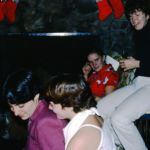


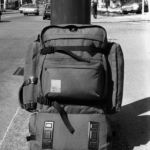

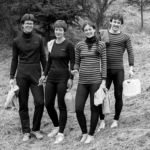
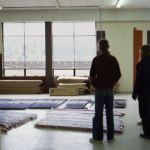

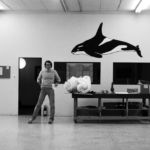



Craig - I started at MEC in Sept 1984 and was let go Aug 2017
I was a buyer for just over 28 years and worked in mail order for just over 4 years so around 33 years at MEC.
Just one clarification. MEC changed sleeping bag production in the late 80’s from Canada to China because of poor quality and lack of production in Canada. When the local sleeping bag manufacturer in Van shut down, MEC found a new manufacturer in Montreal. There quality was so bad that MEC had to weight and label the synthetic bags as underweight, overweight or regular fill and discount them. The factory also couldn’t supply anywhere near the volume MEC required. The China product was consistent quality and we could increase orders and buy all we wanted. The same things were done with day packs around the same time. SuperSport couldn’t keep up to the demand of MEC Klettersacs. The colour were never consistent either so the optional accessory pocket colours never matched the packs. Serratus continued to make all the mountaineering packs, PFD’s and panniers until they shut down in 2004
Photos – #3 Marty? and Jane Weller in front of bolts of fabric
#4 Black and White – Trudy Thumm Member #99999-0 Was at MEC for 35+ years
#8 Betsy McLeod – Pink sweatshirt – Store Manager in the early 80’s and then supplier of High Gear children’s clothes and Cactus Creek accessories.
#10 Steve Grant left with headlamp
#12 Terri and Brenda Wall I’m the foreground.
#16 Sue Burns far right at the beach
#20 Dan Campbell – DC manager in front of the Orca at 428 West 8th. He went on to be the catalogue coordinator for many years.
Cheers
Craig September 30, 2020 – 1:24 pm
Raymond Parker - Hi Craig. Thanks for the input. Much appreciated. I realize that scale had some influence on buying decisions. I’m also party to some of the other reasons the Co-op moved to offshore manufacturing, aside from the general race to the bottom of pricing, which has us where we are today, for better or worse (full-disclosure: I just bought some Chinese studio strobes that are a fraction of the price of the US-made brand they copy. We’ll see how long they last).
Thanks also for Trudy’s surname. Perhaps you have the captions turned off; I’ve identified most of the people in the photos, including Steve Grant, Dan Campbell (he recently forwarded a hilarious photo of me he took in the warehouse). My soul brother Bryan Beard is with Jane, and Betty McLeod hired me, in ’81. She moved, along with a few other former MEC employees to Cortez Island, where they manufactured the High Gear stuff. I’m told she lives in Mexico.
I can’t locate you in #12.
Cheers,
RaySeptember 30, 2020 – 1:44 pm
Craig - Sorry that was autocorrect on my #12 comment. Should have been “in” and not I’m.
Craig September 30, 2020 – 3:48 pm